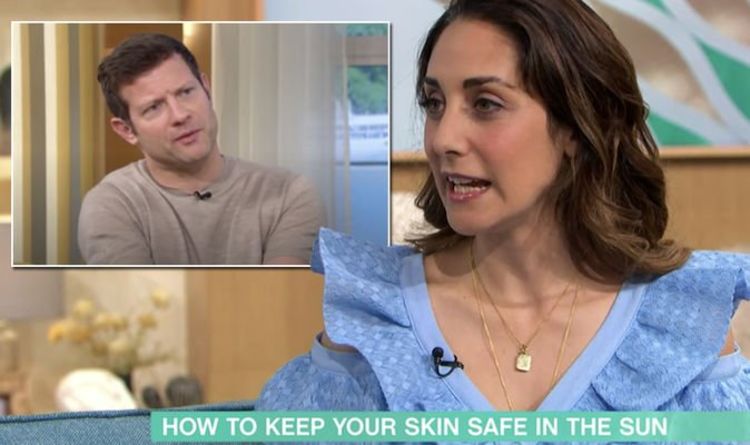
Dr Sara offered advice on how to stay safe in the sun on This Morning, from what to do if you get sunburned to checking for symptoms of skin cancer. When it comes to getting your daily vitamin D intake, the TV doctor said it’s best to stay inside when the sun is strong. We can get vitamin D from supplements and from foods such as oily fish, red meat, liver and egg yolks. But This Morning presenter Dermot O’Leary had to stop Dr Sara in her tracks to make clear it’s safe to go outside in the sun this summer, as long as you take the right precautions.
Dermot said: “We don’t want people not to enjoy the outdoors. It’s really important that we don’t want to scaremonger and stuff, and people need their vitamin D.
“So we don’t want people not to be going out, do we?”
Dr Sara replied: “Vitamin D we get primarily from a reaction from the sun on our skin. But we have to remember vitamin D can be got in much safer ways through tablets, supplementation or through foods.
“We also know that studies have shown the way that we apply sunscreen is not particularly efficient.
“So actually, in practical terms, we’re probably getting enough of vitamin D through our skin.”
So how should we correctly apply sunscreen?
Dr Sara explained: “Let’s say you want to cover your face, your neck and your arms, you want at least two teaspoons full of sunscreen.
“And if you’re sunbathing, out on the beach and you’re wearing a swimming cossie, the rest of the body needs around two tablespoons.”
You should also choose a sun cream that has the following:
- At least SPF30
- At least 4-star UVA protection
- The letters “UVA” in a circle, also indicates that it meets the EU standard
If you do get sunburned, Dr Sara recomends the following:
- Get out of the sun
- Cool down with a cold shower/bath/cool damp cloth
- Put on aftersun
- Stay well hydrated – drink plenty of fluids
- Where loose, cool clothing
- Avoid any more sun
The signs of heat exhaustion include:
- a headache
- dizziness and confusion
- loss of appetite and feeling sick
- excessive sweating and pale, clammy skin
- cramps in the arms, legs and stomach
- fast breathing or pulse
- a high temperature of 38C or above
- being very thirsty
If someone shows signs of heat exhaustion, they need to be cooled down says the NHS.
Call 999 if you or someone else have any signs of heatstroke:
- feeling unwell after 30 minutes of resting in a cool place and drinking plenty of water
- not sweating even while feeling too hot
- a high temperature of 40C or above
- fast breathing or shortness of breath
- feeling confused
- a fit (seizure)
- loss of consciousness
- not responsive
Heatstroke can be very serious if not treated quickly.
Published at Thu, 03 Jun 2021 10:19:00 +0000
‘We don't want to scaremonger!' Dermot O'Leary checks Dr Sara's vitamin D advice













